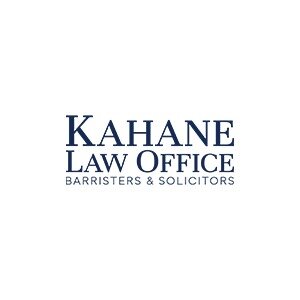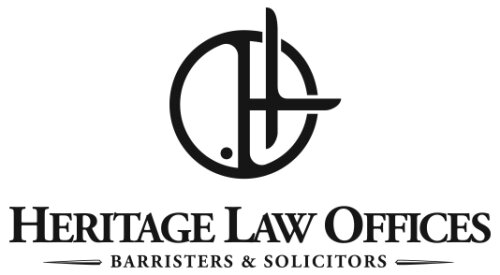Best Climate Change Law Lawyers in Edmonton
Share your needs with us, get contacted by law firms.
Free. Takes 2 min.
List of the best lawyers in Edmonton, Canada
About Climate Change Law in Edmonton, Canada
Climate Change Law in Edmonton, Alberta addresses the legal aspects of reducing greenhouse gas emissions, adapting to changing environmental conditions, and ensuring compliance with both provincial and federal regulations. The law encompasses a range of legal instruments including policies, regulations, and municipal bylaws aimed at mitigating the impact of climate change. In Edmonton, specific initiatives like emissions reduction targets, renewable energy programs, and sustainability guidelines help shape the legal environment. This field of law is evolving rapidly as governments, businesses, and individuals respond to the urgent need for climate action.
Why You May Need a Lawyer
Navigating Climate Change Law can be complex, particularly when you encounter unique situations or regulatory changes. Common reasons you may need legal help include:
- Understanding compliance requirements for new developments or business operations
- Responding to enforcement actions or government penalties for non-compliance with emissions standards
- Seeking permits for renewable energy projects such as solar or wind installations
- Engaging in land use planning or rezoning involving environmental considerations
- Participating in public consultations about climate action policies or infrastructure projects
- Navigating incentives and grants related to climate adaptation and mitigation
- Addressing disputes over environmental impacts or liabilities between private parties
Legal professionals in this area can offer insight into changing laws, help manage risks, and represent your interests before local authorities or in court if necessary.
Local Laws Overview
In Edmonton, Climate Change Law is shaped by a combination of municipal, provincial, and federal regulations. Key local aspects include:
- City of Edmonton’s Community Energy Transition Strategy - This sets targets for reducing city-wide greenhouse gas emissions and outlines actions for sustainable energy use.
- Edmonton Zoning Bylaw - Contains provisions requiring green building standards and energy efficiency measures for new developments.
- Alberta's Environmental Protection and Enhancement Act (EPEA) - This provincial law regulates emissions, environmental impact assessments, and pollution control, directly impacting projects in Edmonton.
- Carbon Pricing and Emissions Reporting - Businesses may be subject to Alberta’s Technology Innovation and Emissions Reduction (TIER) Regulation and the federal carbon pricing system.
- Building Codes and Energy Standards - Updated codes require improved energy efficiency and may govern the use of alternative energy systems such as solar panels.
New projects, especially in construction, industry, and energy, often require adherence to these laws, and failure to comply may result in significant liabilities.
Frequently Asked Questions
What is Climate Change Law?
Climate Change Law involves legislation and regulations that aim to address the causes and consequences of climate change, ranging from emission limits to energy efficiency standards and sustainable development policies.
Which level of government is mainly responsible for climate change laws in Edmonton?
Climate change laws are shaped by municipal, provincial (Alberta), and federal governments. Each level has distinct responsibilities, from local zoning and development control to provincial emission regulations and federal carbon pricing.
How does Edmonton regulate greenhouse gas emissions?
Edmonton follows both Alberta’s provincial frameworks and its own strategies, such as the Community Energy Transition Strategy, to reduce emissions. Larger facilities must comply with reporting and reduction requirements under the provincial TIER Regulation.
Can I install solar panels on my property in Edmonton?
Yes, Edmonton encourages renewable energy projects. However, you must comply with building codes, zoning requirements, and obtain necessary permits from the city.
Are there incentives for energy-efficient or green construction?
Yes, both the city and provincial authorities offer incentives such as grants, rebates, and tax credits for qualifying projects that improve energy efficiency or use renewable energy sources.
What penalties exist for violating climate change regulations?
Penalties can range from fines to operational restrictions and, in severe cases, closure of facilities. Enforcement may be conducted by provincial or municipal authorities depending on the specific regulation.
How do climate laws affect new real estate developments?
New developments must meet updated building and environmental codes. Projects are often required to include energy efficiency measures, manage storm water, and consider low-carbon infrastructure.
Is public input considered in local climate policy decisions?
Yes, public consultation is a key component of many policy and project approval processes in Edmonton. Residents can participate in hearings and provide feedback on climate and environmental initiatives.
Do businesses have to report their emissions in Edmonton?
Many industrial businesses are required to report their greenhouse gas emissions to the provincial government under the TIER Regulation. Smaller businesses may also be subject to municipal reporting for specific projects.
Can individuals or groups challenge climate-related decisions?
Yes, individuals and organizations have the right to appeal certain permits, participate in consultations, or, in some cases, seek judicial review of government decisions impacting climate policy or local developments.
Additional Resources
If you need more information or assistance regarding Climate Change Law in Edmonton, the following resources can help:
- City of Edmonton Sustainable Development Department
- Alberta Environment and Protected Areas
- Ecojustice Canada
- Environmental Law Centre (Alberta)
- Canadian Bar Association - Environmental, Energy and Resources Law Section
- The Federation of Canadian Municipalities Green Municipal Fund
These organizations provide legal information, educational materials, and sometimes direct support for individuals and businesses navigating climate regulations.
Next Steps
If you require legal assistance in Climate Change Law in Edmonton, consider the following actions:
- Clearly define your legal concern or question relating to climate laws
- Gather relevant documents or correspondence, such as notices from regulatory bodies or development plans
- Contact a local lawyer with experience in environmental or climate change law for a consultation
- Inquire about initial consultations, which may be free or at a reduced rate
- Contact governmental or non-profit organizations for additional guidance or support
- Stay informed of policy updates or regulatory changes that may affect your situation
A knowledgeable lawyer can help you understand your rights and responsibilities, ensure you comply with all applicable laws, and advocate on your behalf if disputes arise.
Lawzana helps you find the best lawyers and law firms in Edmonton through a curated and pre-screened list of qualified legal professionals. Our platform offers rankings and detailed profiles of attorneys and law firms, allowing you to compare based on practice areas, including Climate Change Law, experience, and client feedback.
Each profile includes a description of the firm's areas of practice, client reviews, team members and partners, year of establishment, spoken languages, office locations, contact information, social media presence, and any published articles or resources. Most firms on our platform speak English and are experienced in both local and international legal matters.
Get a quote from top-rated law firms in Edmonton, Canada — quickly, securely, and without unnecessary hassle.
Disclaimer:
The information provided on this page is for general informational purposes only and does not constitute legal advice. While we strive to ensure the accuracy and relevance of the content, legal information may change over time, and interpretations of the law can vary. You should always consult with a qualified legal professional for advice specific to your situation.
We disclaim all liability for actions taken or not taken based on the content of this page. If you believe any information is incorrect or outdated, please contact us, and we will review and update it where appropriate.











